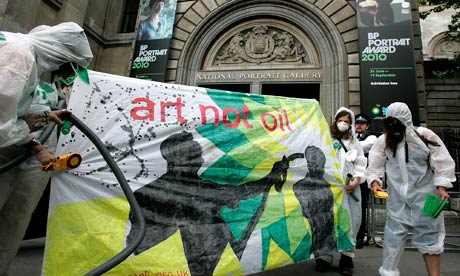A related posting on this site.
from The Guardian:

The summer season of events at Britain's most prestigious galleries and museums will be picketed by artists and green groups intent on portraying BP's arts sponsorship as a toxic brand.
Protests are planned next Monday by an eco-alliance styling itself "Good Crude Britannia" at Tate Britain's celebration of its 20-year association with the international oil conglomerate.
Climate change activists, artists and musicians opposed to the fossil fuel industry are determined to highlight BP's link to the arts in the context of the company's international embarrassment over the continuing oil spill in the Gulf of Mexico.
But the main recipients of BP's corporate largesse – the Royal Opera House, Tate Galleries, British Museum and the National Portrait Gallery – today issued a joint statement defending the connection and signalling their determination to preserve the commercial relationship.
The calls for cultural institutions to distance themselves from the oil industry comes at a time when government spending on the arts is about to be slashed amid efforts to cut public debt.
Many of Europe's leading artists, donors and cultural supporters are expected to be greeted at the glittering annual Tate summer party by Lord Brown of Madingley, chair of the Tate and former head of BP.
The planned demonstration next Monday follows protests this week by a group of artists calling themselves the Greenwash Guerrillas, who distributed leaflets outside the National Portrait Gallery at a BP-sponsored arts event. Greenpeace campaigners followed up with an "alternative exhibition" at a private viewing at the gallery.
The oil company has refused to divulge how much money it donates to the arts in Britain but it is thought, along with Shell, to be one of the most generous donors. In 2005 the figure was estimated to be more than £1m a year. BP also sponsors the Almeida theatre, the National Maritime museum, and the Science and Natural History museums.
"Organisations like the National Portrait Gallery help shape public attitudes towards the big issues of the day and if the gallery is serious about climate change then the sponsorship deal with BP has got to end," said Robin Oakley, Greenpeace's campaigns director.
In a separate development, musicians including Lady Gaga, Korn, Disturbed, Godsmack, Creed, and the Backstreet Boys said they planned to boycott BP on their national tours this year.
"It is absurd that the Tate should be sponsored by a company that is as irresponsible and polluting as BP," said Matthew Herbert, an electronic artist and composer who will headline the jazz stage at Glastonbury this weekend.
The oil industry has been a target for artists and activists for many years. Shell was widely boycotted in the 1990s for its involvement in the Nigerian government's decision to hang the writer Ken Saro-Wiwa.
Last month a group called Liberate Tate entered the gallery's main turbine hall and released dozens of black balloons attached to dead fish in protest against the Gulf oil spill. Gallery staff had to shoot the balloons down with air rifles.
The press opening of the BP Portrait Awards was gatecrashed this week by a film crew from the Don't Panic collective who distributed wine glasses filled with thick black liquid symbolising the spill.
"In the past Imperial Tobacco used to sponsor the portrait awards," said Heydon Prowse, one of Don't Panic's film-makers, "then it was considered no longer acceptable. Perhaps the same should be considered now for BP given its attitude to regulation and tar sands."
The Tate gallery said it had an ethics committee which regularly reviewed its sponsorship deals. "BP is one of the most important sponsors of the arts in the UK supporting Tate as well as several other leading cultural institutions. Tate works with a wide range of corporate organisations and generates the majority of its funding from earned income and private sources. The Board and Ethics committee regularly review compliance with the policy," it said.
The National Portrait Gallery said: "The sponsorship of the annual Portrait Award by BP is now in its 21st year and their support directly encourages the work of artists and helps gain wider recognition for them."
A joint statement – from the Tate, Opera House, British Museum and Portrait Gallery – added: "The income generated through corporate partnerships is vital to the mixed economy of successful arts organisations and enables each of us to deliver a rich and vibrant cultural programme.
"We are grateful to BP for their long-term commitment, sharing the vision that our artistic programmes should be made available to the widest possible audience."
Suggestions that the massive bills being shouldered by BP for the clean up operation in the Gulf might force it to scale back on its support for the arts were dismissed by the company. Many of the deals are subject to long-term contractual agreements. Abandoning them would generate adverse publicity at a sensitive time.
"Everyone has a right to protest," a BP spokesman said, "but we feel sad they would choose to do so since we are doing the best we can to deal with a difficult situation.
"In the States, we have offered grants for research on the impact of the oil and detergents and there are people looking to get that sponsorship. I'm not aware of any arts institutions in the USA or the UK withdrawing [from sponsorship deals]."
Maurice Davies, of the Museums Association, which represents UK galleries and museums, doubted that any institution would immediately disown BP given the firm's record of sustained commitment to the arts. "Museums make judgements about who is a suitable sponsor," he said. "No one would take [money] from tobacco firms or arms companies. BP has a long and distinguished record of sponsorship. No one will rush to judgment on a company that has been a loyal supporter for such a long time. I don't hear a national clamour for BP petrol stations to be shut down."